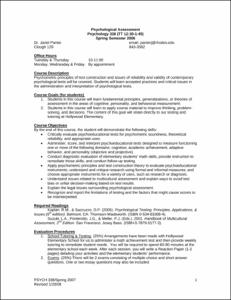Please use this identifier to cite or link to this item:
http://hdl.handle.net/10267/3648Full metadata record
| DC Field | Value | Language |
|---|---|---|
| dc.contributor.author | Panter, Janet | - |
| dc.date.accessioned | 2009-03-25T16:23:39Z | - |
| dc.date.available | 2009-03-25T16:23:39Z | - |
| dc.date.issued | 2007-01-11 | - |
| dc.identifier.uri | http://hdl.handle.net/10267/3648 | - |
| dc.description | This syllabus was submitted to the Office of Academic Affairs by the course instructor. | en_US |
| dc.description.abstract | Psychometric principles of test construction and issues of reliability and validity of contemporary psychological tests will be covered. Students will learn accepted practices and critical issues in the administration and interpretation of psychological tests. Course Goals (for students) 1. Students in this course will learn fundamental principles, generalizations, or theories of assessment in the areas of cognitive, personality, and behavioral measurement. 2. Students in this course will learn to apply course material to improve thinking, problem-solving, and decisions. The content of this goal will relate directly to our testing and tutoring at Hollywood Elementary. Course Objectives By the end of this course, the student will demonstrate the following skills: • Critically evaluate psychoeducational tests for psychometric soundness, theoretical reliability, and appropriate uses. • Administer, score, and interpret psychoeducational tests designed to measure functioning one or more of the following domains: cognitive, academic achievement, adaptive behavior, and personality (objective and projective). • Conduct diagnostic evaluation of elementary students’ math skills, provide instruction to remediate those skills, and conduct follow-up testing. • Apply psychometric principles and test construction theory to evaluate psychoeducational instruments; understand and critique research using formal and informal measures; and choose appropriate instruments for a variety of uses, such as research or diagnosis. • Understand issues related to multicultural assessment and explain ways to avoid test bias or unfair decision-making based on test results. • Explain the legal issues surrounding psychological assessment. • Recognize and report the limitations of testing and the factors that might cause scores to be misinterpreted. | en_US |
| dc.language.iso | en_US | en_US |
| dc.publisher | Memphis, Tenn. : Rhodes College | en_US |
| dc.relation.ispartofseries | Syllabi CRN | en_US |
| dc.rights | Rhodes College owns the rights to the archival digital images in this repository. Images are made available for educational use only and may not be used for any non-educational or commercial purpose. Approved educational uses include private research and scholarship, teaching, and student projects. For additional information please contact archives@rhodes.edu. Fees may apply. | - |
| dc.subject | Psychology, Department of | en_US |
| dc.subject | Syllabus | en_US |
| dc.subject | Text | en_US |
| dc.subject | Curriculum | en_US |
| dc.subject | 2007 Spring | en_US |
| dc.title | PSYC 338-01, Psychological Assessment, Spring 2007 | en_US |
| dc.type | Syllabus | en_US |
| Appears in Collections: | Course Syllabi | |
Files in This Item:
| File | Description | Size | Format | |
|---|---|---|---|---|
| 2007_sp_PSYC_338-01.pdf | 47.45 kB | Adobe PDF |  View/Open |
Items in DSpace are protected by copyright, with all rights reserved, unless otherwise indicated.